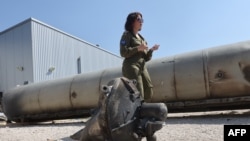The United States said it is working with allies on a coordinated response to Iran's drone and missile strikes on Israeli soil over the weekend. At the same time, it continues to urge Israel to exercise restraint and avoid igniting a wider regional conflict.
President Joe Biden is "coordinating with allies and partners, including the Group of Seven, and with bipartisan leaders in Congress, on a comprehensive response," national security adviser Jake Sullivan said in a statement
The U.S. will impose new sanctions targeting Iran in the coming days, Sullivan said, including its missile and drone program and against entities supporting the Islamic Revolutionary Guard Corps and Iran’s Defense Ministry.
The U.S. will bolster the integration of air and missile defense and early warning systems across the Middle East, he added.
Biden aides have repeatedly called for de-escalation. The president "does not want to see a war with Iran. Don't want to see the conflict widen or deepen," White House national security spokesman John Kirby told reporters Tuesday.
Israel Prime Minister Benjamin Netanyahu has vowed to retaliate, but Israeli officials have not said how or when they might strike.
"We will choose our response accordingly," said Lieutenant General Herzi Halevi, Israel's military chief.
A direct Israeli strike on Iranian soil would amount to another significant escalation, with Tehran already pledging a much harsher response to such a counterattack.
Tehran launched more than 300 drones, ballistic missiles and cruise missiles, most of them intercepted by the Israeli military with the help of the U.S. and regional allies, causing only minor damage to an Israeli base. That suggests Iran may have calibrated the strikes to limit casualties or telegraphed advanced notice, which the White House denies.
Israel's counterstrike will likely target Iranian soil without killing civilians, said Jonathan Rynhold, head of the Political Studies Department at Israel's Bar-Ilan University.
"And it would not seek to publicly hit any very obvious public symbolic buildings of the regime," he told VOA. "That could embarrass the regime and make them feel that they need to escalate it further."
Rynhold said that the Iranian strikes were "very, very carefully calculated," and predicted that a potential Israeli counterattack would be similarly calibrated. Still, they could easily lead to dangerous miscalculation, he said.
Israel could opt for covert operations targeting Iranian officials. Or it could launch a cyberattack, said Gregory Hatcher of White Knight Labs, a cybersecurity consultancy firm.
"If I was Israel, I would stick with the normal cyber warfare playbook that they've been using for the better part of the last 15 years, starting with Stuxnet in 2010," he told VOA.
Under a joint operation, Israel and the U.S. created Stuxnet malware and injected it into an Iranian nuclear facility that "made the centrifuges spin uncontrollably and destroyed millions of dollars and slowed down the nuclear capabilities of Iran," Hatcher said.
Iran said its Saturday strikes were in retaliation for an Israeli airstrike earlier this month on its diplomatic building in Damascus, Syria, that killed seven Iranian military advisers, including two generals.
Pressure on Netanyahu
Netanyahu is facing intense international pressure to bring Israel's war in Gaza to an end and immense domestic pressure to free the hostages held by Hamas.
Israel's war with Hamas began when the militant Palestinian group attacked Israel on Oct. 7, killing 1,200 people and taking more than 240 hostage. Israel's response has killed nearly 34,000 Palestinians, according to the Health Ministry in Gaza. Many humanitarian organizations have warned of famine.
Some international leaders are accusing Netanyahu of intentionally escalating tensions with Iran. This includes Ayman Safadi, the foreign minister of Jordan, a U.S. ally that helped protect Israel from Tehran's attacks.
"It's no secret that Netanyahu's policy aims to expand the conflict to relieve the growing pressure on him globally as a result of the killing, war and destruction he is doing in Gaza," Safadi said Tuesday.
Turkey, a NATO member, has also placed blame on Israel.
"The main one responsible for the tension that gripped our hearts on the evening of April 13 is Netanyahu and his bloody administration," Turkish President Recep Tayyip Erdogan said Tuesday, echoing de-escalation calls by regional and Western leaders.
Israel has neither confirmed nor denied the Damascus attack and has not responded to the accusations from Jordan and Turkey.
It's unclear whether Netanyahu will heed calls to de-escalate as he calculates a response that satisfies far-right members of his government and his own political instincts, said Barbara Slavin, distinguished fellow at the Stimson Center.
"He has always wanted to attack Iran, in particular to go after the Iranian nuclear sites. He may see this as his last opportunity to defeat all of Israel's enemies — Hezbollah, Iran, you name it," she told VOA. "And who will stop him? I'm very, very worried about that."
Whatever option Netanyahu decides on, Biden has told him the U.S. will not participate in Israel's counterattack.
Begum Erzos of VOA's Turkish Service contributed to this report.






